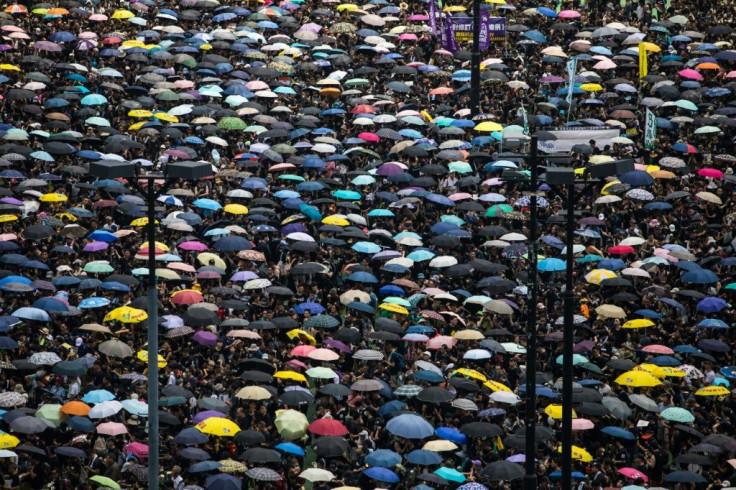China Envoy Rules Out Hong Kong Concessions Ahead Of Crunch 'Dialogue'

A top Chinese envoy ruled out making any further concessions to pro-democracy protesters in Hong Kong on Wednesday, just a day before the city's embattled leader meets the public in a bid to defuse the months of chaos.
Hong Kong has been rocked for more than three months by huge and sometimes violent protests pushing for greater democratic freedoms and police accountability.
The movement represents the biggest challenge to Beijing's rule since the international finance hub was handed back by Britain in 1997.
Carrie Lam, the city's unelected pro-Beijing leader, is set to meet with 150 people chosen by lottery on Thursday night for the first of what is being billed as a series of "dialogue sessions".
Her administration has portrayed the gatherings as an opportunity for Hong Kongers to "vent their anger" and find a way forward after more than 100 days of protests.
But it is unclear what, if anything, Lam can offer.
On Wednesday, a top-level diplomat from Beijing said it was up to Hong Kong's local government to decide how to deal with the protests.
But he also dismissed the demands made by the movement.
"Response does not mean concession," Song Ru'an, a deputy commissioner at the foreign ministry's office in the city, said at a rare, three-hour briefing with foreign reporters.
"It will be blatant political blackmail and coercion if anyone believes only acceptance of each and every demand of the opposition counts as response," he added.
Song's remarks illustrate the limited wiggle room given to Lam, who privately spoke of her hands being tied by Beijing in a leaked audio recording obtained by Reuters earlier this month
Key demands being made by the movement include an independent judge-led inquiry into the police, an amnesty for those arrested and full universal suffrage.
'Invite more trouble'
So far the main concession has been to scrap a proposal to allow extraditions to the mainland, a widely-loathed bill that sparked the initial protests before they then snow-balled into a much wider movement.
Historically Beijing has said it is willing to allow Hong Kongers some form of universal suffrage, but people will only be allowed to vote for a small number of pre-vetted candidates.
That stance sparked the huge "Umbrella Movement" protests in 2014.
But it also lies at the heart of the current political unrest which has seen millions hit the streets and increasingly violent clashes between police and a minority of hardcore protesters.
Song said Beijing remained committed to its blueprint for a limited form of universal suffrage but said now was not the time to reintroduce it.
"Forcibly advancing dual universal suffrage at such a moment will only invite more trouble," he said.
More than 1,400 people have been arrested this summer, including nearly 80 people charged with rioting, which carries up to ten years jail.
As Song was speaking, some of those slapped with rioting charges were appearing in court.
Asked whether any of the grievances voiced by Hong Kongers were legitimate, Song said Hong Kong had some "problems" but declined to say what they were.
And he called on peaceful protesters to distance themselves from their violent colleagues before any further steps could be taken to redress local concerns.
Asked if he or his colleagues had been able to test the temperature on the streets, Song replied: "No we have not talked with protesters and we have no friends who join or sympathise with the protesters."
Hong Kong is bracing itself for a fresh round of protests in the coming days with Saturday marking five years since the Umbrella Movement kicked off and Tuesday being the 70th anniversary of communist China's founding.
© Copyright AFP 2024. All rights reserved.





















